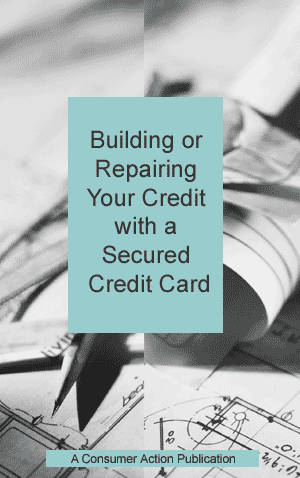Building or Repairing Your Credit with a Secured Credit Card
Even people with damaged credit may be able to obtain a secured credit card by depositing money in a savings account. This booklet explains what to look for when shopping for a secured credit card-and what to avoid.

Publication Series
- This publication is not currently associated with any training series.
Download File
PDF files may contain outdated links.
Building or Repairing Your Credit with a Secured Credit Card
File Name: Secured_EN.pdf
File Size: 0.91MB
Languages Available
Table of Contents
YOU NEED CREDIT TO GET CREDIT
Credit cards can be more than a convenient way to make purchases and pay for them over time. Having a credit card and using it wisely helps you build a record that can make it easier for you to apply for other types of credit - car loans, home mortgages, home equity lines of credit and personal loans.
But if you've never had a credit card and you want one, you might be faced with a puzzling fact of life: You need credit to get credit.
Not everyone who applies for a credit card gets one. Often, people who have been denied conventional credit cards can get a secured credit card instead. A secured card is a bank credit card backed by money that you deposit and keep in a bank account. That account serves as security for the card. If you don't pay your bill, your deposit may be used to cover that debt.
What kind of credit do you have?
Credit card issuers look not only at your income but also at your credit history - how you have handle credit in the past. How does your credit history rate?
- Good credit - you always pay your bills on time and stay within your credit limits. You manage your overall credit by having only the credit you need and don't max out your cards. You shouldn't have trouble getting the credit you need.
- No credit - you've never had a credit card or a loan from a bank or a finance company, so you do not have a credit history on file with any of the major credit bureaus. Almost all secured card issuers accept people who have no credit history. This makes secured cards a good option for young adults who are just entering the credit market, or for married women who have never had credit in their own names.
- So-so credit - you make payments late sometimes, but not more than once or twice in several years. Some lenders might grant you an unsecured credit card, but you might pay a higher-than-average interest rate.
- Badly damaged credit - you've been seriously tardy (more than 60 days late) in paying your bills several times in the past year, your debts have been referred to a collection agency, you failed to pay a credit card debt in the last seven years or you've filed for bankruptcy in the past 10 years. Some companies offer secured credit cards to people with poor credit or even a past bankruptcy. This makes secured cards a good option for people who are trying to reestablish a positive credit history.
Credit reports To find out how you have handled credit in the past, lenders look at your credit report—a record of your credit accounts and loans compiled by companies called credit reporting bureaus. The three largest credit reporting bureaus are Equifax, Experian and TransUnion. (For contact information, see back page.)
Credit bureaus receive regular reports from companies that issue consumer credit. They store the information in databases and make it available to lenders who want to screen applicants. The data on file about you includes your current and closed credit card and loan accounts, payment history, maximum credit lines and current balance information. Negative payment information can remain on your credit report for seven years; bankruptcy, for up to 10 years. You have the right to check your credit report and correct any errors.
How secured cards work
To obtain a secured credit card, you deposit money in a savings account. (Minimum deposits range from $100 to $500.) The account is frozen while you have the card. If you fail to pay your credit card debts, the funds in the account may be used to cover your obligations.
Some issuers pay you interest - up to 4.5% - on the account. Some don't pay interest on deposits unless they exceed a certain amount.
Secured cards - issued with the MasterCard or Visa logo-look and are used just like unsecured cards. To the rest of the world, they are just credit cards.
Credit limits
Most secured credit card issuers will give you a credit line equal to 100% of the amount you have on deposit, but some will grant you credit equal to only a part of your deposit. A few issuers offer credit lines of double the amount you have on deposit - a kind of hybrid account where part is secured and part unsecured.
Some banks may increase your credit line without additional deposits after you have paid on time for several months. Other issuers charge a fee for credit line increases - use caution when accepting such a deal.
Card companies have different requirements
Some cards are easy to get if you have money to deposit, while others have strict guidelines about income and past credit history.
Some - but not all - issuers require that you be a U.S. citizen, while others will accept applicants with residency status. Most companies will not consider applicants who have late payments in the last six months on their credit report. A few issuers will not consider applicants with a past bankruptcy.
Obtain a copy of your credit report from each of the three major credit bureaus before applying so you can correct any inaccuracies.
When you apply for a secured credit card, be prepared to provide:
- Your Social Security number.
- Proof of income.
- Your home phone number.
- Employment verification.
- Address verification.
Compare different cards
Hundreds of financial institutions offer secured credit cards, from large and small banks to credit unions (a financial institution owned by
its members, who share a common bond, such as the same occupation).
Many banks offer cards on the Internet as well. Bankrate.com site allows a search of cards offered Bankrate.com site allows a search of cards offered by national and local banks and credit unions.
Terms to ask about
- Annual percentage rate (APR). This is the amount of interest you will pay on your balance. (If you pay your bill in full and on time every month, you can usually avoid paying interest.) Secured credit cards usually have very high APRs of 20% - 30%.
- Annual fees. Virtually all secured cards have annual fees - look for the lowest annual fee and APR you can find. If the card has a monthly fee, make sure you add up the monthly payments and compare the total to those with annual fees.
- Application fees. (Also called processing program, account set-up or membership fees.) These can be as much as $250, and are charged to your first statement. Even if you have very bad credit, it's possible to find a secured card without these fees. Under federal law, some of these fees may be refundable if you cancel your account within a few days after submitting an application or receiving a card.
- Late and over-the-limit fees. Don't send your payment in late - not only does it hurt your credit, but you'll be charged a late fee of up to $35. A simiilar fee is charged when you exceed your credit limit. Many people believe the card won't work when it's maxed out - this isn't always true. You will continue to be charged an over-the-limit fee every month until you bring your balance under the limit.
- Penalty rates (default rates). Most issuers will increase your APR - sometimes by 10 percentage points or more - if you make even one late payment. Don't let this happen - it will take up to a year of on-time payments before the issuer will lower the APR.
- Grace period. The grace period is the time between the close of the billing cycle and the payment due date - usually at least 20 days. During the grace period, no interest accrues on your card account unless you have an outstanding balance or cash advances. Some secured cards have no grace period, which means you pay interest on all purchases from the day they are made.
- Credit reporting. Make sure that the issuer reports your payments to one or all of the major credit reporting agencies on a regular basis. Frequent reports of on-time payments will help you build your credit a lot faster.
Graduating to an unsecured card
Secured cards can be used as a stepping stone to a regular, unsecured credit. Use your card to make purchases - just having the card but not using it does not help you build credit. Try to graduate to an unsecured card as soon as you can by making sure all your payments reach the company before the due date and staying within your credit limit.
Having a secured credit card can help you build or reestabish your credit, but a missed payment or a bounced payment check will set you back badly. If you are having money troubles, at least pay the minimum amount due on your credit card by the due date. When you can, make more than the minimum payment to avoid extra interest that will prolong your debt.
After six months to one year of on-time payments and careful use of your credit limit, you may begin to get offers from unsecured credit card issuers. Before accepting any card, read the fine print carefully. Don't cancel your current card until you receive the new one.
Another breed of card
 Many companies now offer high-interest unsecured credit cards that target people with damaged credit. Most of these cards do not require a security deposit - but this is not neessarily a good thing. some cards have low lines of credit (less than $300), very high APRs, very high up-front fees ($100-$300) and no grace periods. The up-front fees usually are charged to the first bill you receive and in some cases, this charge is equal to your entire line of credit. This means the card can't be used without penalty until you have paid off most of the fees.
Many companies now offer high-interest unsecured credit cards that target people with damaged credit. Most of these cards do not require a security deposit - but this is not neessarily a good thing. some cards have low lines of credit (less than $300), very high APRs, very high up-front fees ($100-$300) and no grace periods. The up-front fees usually are charged to the first bill you receive and in some cases, this charge is equal to your entire line of credit. This means the card can't be used without penalty until you have paid off most of the fees.
Optional services
Many credit card companies sell optional services - it is not necessary to buy these to get a credit card. Examine these offers carefully to make sure you will be getting a good deal. Some examples:
- Credit disability or life insurance. For a payment of 60cents or more per $100 of your credit acrd balance, credit disability insurance will pay just the minimum monthly payment on your card for a limited time while you can't work. If you die, credit life insurance pays your lender - not your family. Credit insurnace products have strict guidelines - for instance, many programs won't pay if the card holder is a part-time employee or owns his or her own business. Term life insurance, offered by many insurance companies, is a much more cost-effective, flexible alternative for protecting your family.
- Credit report monitoring. For a fee of up to $100 per year, these programs keep an eye on your credit report, alerting you when there is a new application for credit, the possibility of fraud or when negative information is reported. You can do this yourself by ordering your credit report from all three bureaus each year, at a total cost of about $25.
- Coupon or discount books and clubs. For a one-time or annual fee, you receive discount coupons and/or special offers for entertainment, restaurants, stores or travel. Many offers come with restrictions that make them come with restrictions that make them difficult to use.
Deceptive advertising and sales

Con artists are always out to prey on the unwary. When looking for a secured credit card, make sure the company has written disclosures about APRs and fees, as well as other terms and conditions. A lack of disclosures could be a sign of fraud.
The federal Telemarketing Sales Rule makes it illegal to collect an up-front fee in return for the promise of a credit card or credit repair service. Never give your credit card or bank account number to anyone who calls you with an unsolicited offer—you could end up losing money.
Billing disputes
If you have a billing dispute, call the customer service number on your card or billing statement and ask for help. If the person who answers is not helpful, ask to speak to a manager.
The Fair Credit Billing Act is a federal law that protects you from credit card billing errors and unauthorized charges. You have the right to ask the card issuer to remove and investigate any charges that you dispute.
Under the law:
- You must report errors to the credit card issuer in writing within 60 days of the date of the statement in which they appeared. (Many issuers will initiate a dispute report over the phone while they wait for your written complaint).
- After receiving your complaint, the company cannot try to collect the disputed amount or report your account delinquent because of it.
- The issuer has 30 days in which to acknowledge your dispute. Within 90 days of the acknowledgment, the issuer must correct the error or explain why it believes the charge is valid.
- If the dispute is settled in your favor, you don't have to pay interest on the disputed charge.
- If the dispute is settled in the merchant's favor, you must pay the disputed amount plus accrued interest.
If you have a problem with the quality of items or services purchased with a credit card, try to correct the problem with the merchant. if you can't resolve the problem, you may have the right not to pay all or part of the amount due. In order to qualify, the charge must have been made in your home state or within 100 miles of your mailing address and the purchase price must have been more than $50.
For more information
- Banking regulators. Every credit card issuer is overseen by a government agency.Try to settle all complaints directly with the company. If that fails, complain to the agency that regulates the issuer.To find out which agency regulates your bank, call the Federal Deposit Insurance Corporation at (877) ASK-FDIC (275-3342), or visit its web site (www.fdic.gov).
- Better Business Bureau (BBB). Before applying for a card, see if the BBB has any complaints about the issuer.Nationally, the BBB maintains reliability reports on about three million businesses. On the BBB Online web site (www.bbbonline.org) you can search for businesses and find out how to contact the BBB nearest you.
- Credit reporting bureaus. To check your credit report, contact one or all of the three largest credit bureaus. Unless you have recently been denied credit, the cost is about $8.50 per report.
Credit Reporting Bureaus Equifax Experian TransUnion www.equifax.com www.experian.com www.transunion.com (800) 685-1111 (888) 397-3742 (800) 888-4213 - Federal Trade Commission (FTC). You can file a fraud complaint with the FTC's Consumer Response Center at (877) FTC-HELP (382-4357).The FTC does not resolve individual consumer problems, but can bring charges against a company for violations of federal consumer protection laws.
- Consumer Action. A national non-profit education and advocacy organization providing consumer advice, referrals to appropriate complaint handling agencies and free consumer education publications. Leave a message and a counselor will call you back. Chinese, English and Spanish spoken at (415) 777-9635 and (213) 624-8327;TTY: (415) 777-9456. Web site: www.consumer-action.org.
This brochure was created by Consumer Action in partnership with Providian Financial.
Published / Reviewed Date
Published: October 22, 2002
Download File
Building or Repairing Your Credit with a Secured Credit Card
File Name: Secured_EN.pdf
File Size: 0.91MB
Sponsors
Providian Financial
Filed Under
Credit ♦ Credit Cards ♦
Copyright
© 2002 –2024 Consumer Action. Rights Reserved.



